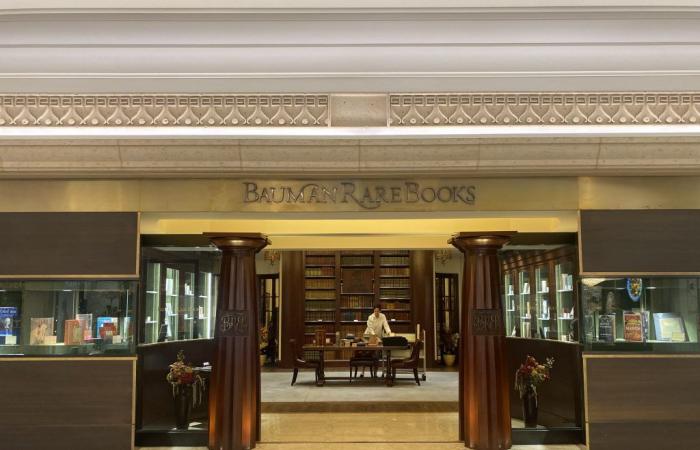Las Vegas rarely rhymes with bookstores. The city of vice, whose metropolitan population exceeds 2 million inhabitants, has only a handful. Among them, only one dared to establish itself in the heart of the Strip, the immense boulevard which concentrates hotels, clubs, casinos and other disproportionate performance halls. Since 2008, Bauman Rare Books has taken the gamble of setting up in the Grand Canal Shoppes shopping center at The Venetian hotel, a few meters from a cardboard Venice where the gondoliers sing in English to drown out the noise of the neighboring slot machines.
In this unusual environment for an independent bookstore, Bauman nestles between luxury ready-to-wear boutiques and flashy restaurants. At first glance, it looks like an investment bank with marble floors, engraved columns, thick carpets and cozy club chairs. The two booksellers who work there warmly welcome customers, or rather the curious who sometimes think they are entering a gallery or a museum.
Flaubert, George Lucas, Darwin and the others
Because behind thick windows the treasures of Bauman Rare Books are revealed: rich old volumes, prestigious first editions or extremely rare handwritten letters. “On average, we sell one book per day,” smiles one of the employees. How can we hold on financially, then, in a country where the cost of real estate and utilities is reaching new heights? A look at the prices displayed will be enough to find an answer. On the day of our visit, the least expensive work — a first edition in French of Provence by Émile Ripert (1929) — is offered at $1,500 (or €1,384).
You will indeed have to be very lucky at the neighboring poker tables to be able to treat yourself to a book at Bauman. Among the few hundred references available for sale during our visit, we will come across precious editions of The Great War of Winston Churchill ($2,200), Madame Bovary of Gustave Flaubert ($9,500), Democracy in America ofAlexis de Tocqueville ($60,000) or even a first edition ofOn the Origin of species of Charles Darwin accompanied by a handwritten letter addressed to its publisher. To leave with this last set, budget $125,000…
In a more contemporary register, we will find untraceable collections signed by JK Rowling, George Lucas or Stephen Hawking. In the rest of the shelves, Beethoven is displayed alongside Albert Einstein, Freud sits alongside an edition ofHamlet published in 1683, and Jane Austen mixes with the writings of Tolkien, Montaigne, George Orwell, Virginia Woolf, Hemingway and Fitzgerald. Most of the books offered are signed by the hand of their authors, or accompanied by handwritten letters, justifying the craziest prices.
But not all of Bauman’s riches are revealed here. At the back of the bookstore area of approximately 80 m², visible behind a thick glass door, a private lounge awaits the wealthiest collectors. “They have access to our catalog and our most exclusive pieces,” slides a bookseller. Parts stored in a second store, located on Madison Avenue in New York, or at the company’s headquarters in Philadelphia.
Bauman also buys books
Note that it is possible for readers who think they have a treasure at home to offer it to Bauman. But the conditions of repurchase are very strict: in addition to the rarity of the work, it must also be in perfect condition and complete, that it is most often a first edition, and that it sticks to the spirit from the catalog of the luxury bookstore. It must also not appear on any online sales site. Fulfilling these conditions, Bauman’s teams “maybe” make an offer, according to a note posted in the bookstore.






